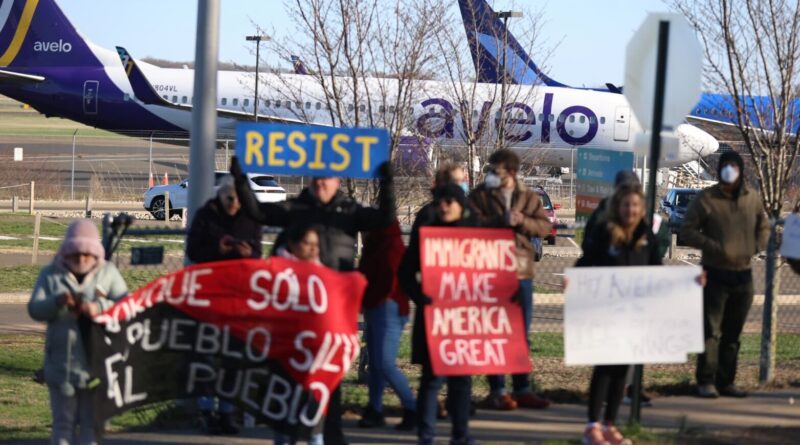Human Rights Groups Protest Against Avelo Airlines for Deportation Flights
Groups with a keen interest in human rights, such as the Immigrant Allies Forum, Indivisible Wilmington, and the Democratic Socialists chapter in Wilmington, recently staged a protest near the scenic Wrightsville Beach. Their proposition to vacationers driving by was simple yet profound – ‘choose airlines conscientiously.’ Given the sizable flow of vacation traffic, the chosen spot was designed to reach as many people as possible with their message.
A key motive behind the protest related to Avelo Airline’s agreement made earlier this year with the U.S. Immigration and Customs Enforcement (ICE), permitting them to manage flights deporting immigrants. One individual leading the protest stated their purpose was to educate the public on how county funds were used to advertise Avelo’s Wilmington and other destinations, enticing tourists to explore these locales.
Their central message was about encouraging individuals to ‘vote with their dollars,’ pointing out that while Avelo’s fares might be less expensive, the unintended cost in human rights could be substantial. Avelo Airlines, a budget air service provider, flies to 23 states across the US, and in the recent past, Wilmington became one of their new bases of operation.
From the moment Avelo set up its base in Wilmington, voices of protest arose across the city. The first demonstration against Avelo was staged directly outside the airport in May, evolving into this week’s nationwide movement pressuring the airline to reevaluate its deal with ICE. The protest against the airline’s contract is not a local event but part of a large-scale national campaign.
The unfolding protest sequence is extensively spread across the country, with each city hosting an Avelo base participating. An individual involved in the protest offered additional insight into the situation: Avelo Airlines, serving commercial passengers, is singular in its contract agreement with ICE to operate deportation flights from Arizona to El Salvador.
The protestors urged people to show solidarity by boycotting the airline. Despite the division on immigration matters and the challenge of altering viewpoints, the primary goal remains on persuading passengers to opt for other airlines. Signs of success are already visible, according to one protestor.
They pointed out recent changes at Avelo as potential indicators, noting the airline’s decision to cancel some flights and reduce its presence in some routes—though these changes have not affected the Wilmington operations. The expectation is that local initiatives will eventually lead to substantial transformation.
Avelo, however, defends the decision to cooperate with ICE, arguing that the financial stability they gain from the arrangement is essential. In an attempt to shed light on this partnership, an advocate from the steering committee of one protesting group filed a public records request with the New Hanover County Airport Authority.
After several weeks, the Deputy Airport Director responded with information to clarify that the Airport Authority did not provide funding to Avelo, nor did they authorize any budget amendments specifically for the airline. He also shared a copy of Avelo’s lease agreement typical for all airlines operating out of the Wilmington Airport (ILM) and highlighted the standard incentive program available to every airline.
An acknowledgment followed after persistent queries from the advocate, admitting that local marketing funds have indeed been invested to promote Avelo flights and ILM Airport since the airline commenced its operations. Avelo’s influence on the local economy has been profound since they started their operations.
However, one protestor questioned the economic impact of Avelo, stating, ‘It’s difficult to reconcile, considering the total tourist expenditure in New Hanover County stood at $1.1 billion in 2023, contrasted with the entire annual GDP of the county, falling below $20 billion for the last fiscal year. Framing the airline to bear the credit for such a significant part of the economic activity seems a stretch.’
He further questioned the ethical consequences of supporting Avelo’s operations by highlighting the real issue – the willingness to overlook their role in alleged unlawful and inhumane deportations, merely for economic benefits. He questioned the moral implications of being complicit in these deportations by providing business to the airline.
The protestor introduced a contemplative perspective for the audience, urging them to question if commercial benefits should override humanitarian considerations. If we accept and permit such flights, what does it say about the dollar value we’re placing on principles and ethical considerations?
What makes these incidents worth discussing is the challenging dilemma it poses – how should we react when a company we economically profit from indulges in activities we morally oppose? We must balance the delicate equilibrium between economic growth and ethical conduct.
This situation raises an important question for the wider society and forces a realization. We, as consumers, must not overlook the potentially unethical actions of a company merely due to their economic contributions.
In conclusion, the protest was a call to action for the public to ponder upon the moral impact of their choices and to align their actions with their values. The situation encapsulates a practical conundrum of economic benefits versus moral implications, a question we as a society need to address earnestly.

